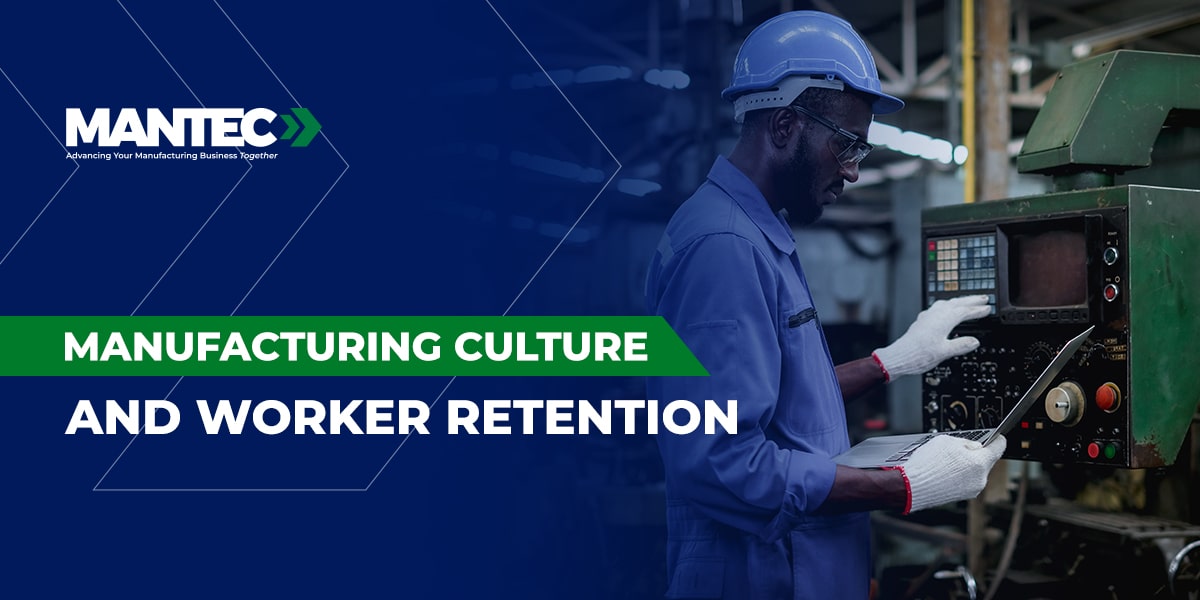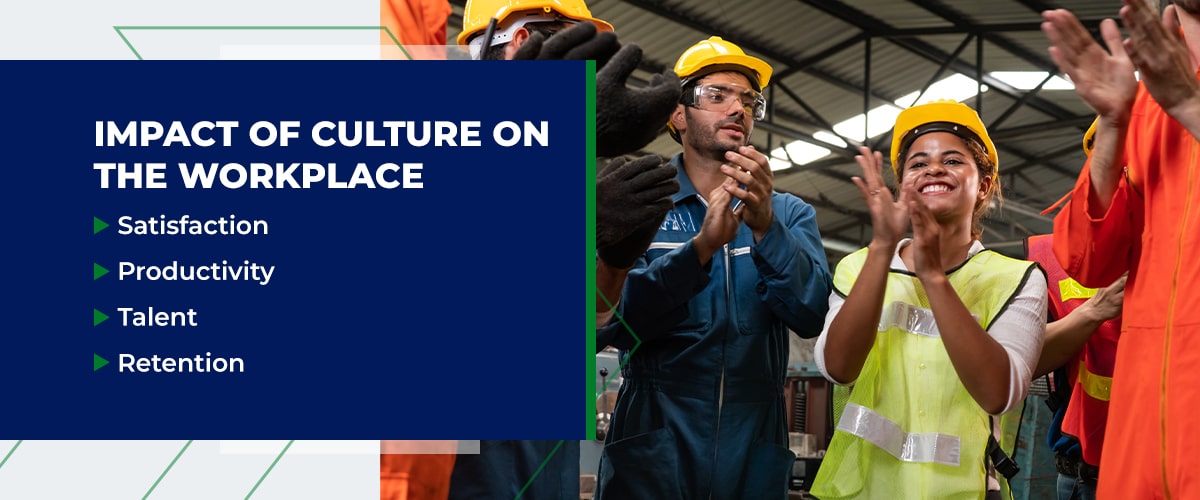In the complex and competitive world of manufacturing, where product quality and operational efficiencies are…

Manufacturing Culture and Worker Retention
Workplace culture is becoming more important than ever. Younger generations expect businesses to express values in the workplace, and if they don’t, they’ll likely find work elsewhere.
Like many other types of businesses, the manufacturing industry will need to find ways to build a culture that appeals to people so it can retain and attract workers.
To create an appealing culture, you’ll need some valuable information like the impact of culture on the workplace, the type of culture you should build and how to build it.
Work Culture in the Manufacturing Industry
Traditionally, work culture in the manufacturing industry is particularly rigid, with little room for employees to stray out of their designated roles. While this may seem like a beneficial route to go to promote organization and compliance, it can sometimes make workers feel as though they are stuck or invaluable.
Employees are not as willing to put up with toxic environments, poor compensation and constraints anymore. This is reflected by the turnover seen in the manufacturing industry and the American workforce as a whole. If the company doesn’t have a good company culture, employees will have no trouble finding a job elsewhere.
Impact of Culture on the Workplace
Company cultures’ effect on manufacturing is significant. While it may not seem an important factor at first glance, it has become a driver of many different aspects of the workplace, including satisfaction, productivity and employee retention:
- Satisfaction: A good company culture breeds satisfaction in employees. Aspects like flexibility, good pay and an understanding of workers’ needs will make people feel heard and valued. This is a massive benefit for both employees and managers alike.
- Productivity: Job satisfaction will boost the productivity of employees. When they feel valued, they will have a reason to be productive and drive the company forward. In this sense, the relationship between the company and employee becomes mutual — both working together to drive each other’s progress.
- Talent: A great company culture can attract fresh talent. You’ll be able to have more leverage in negotiations and use your culture as a tool to attract skilled workers.
- Retention: Manufacturing culture and worker retention go hand in hand. One of the primary reasons for turnover today is poor workplace culture. With the right culture, workplaces can provide a reason for employees to stay.
Company culture and employee retention are linked, so it’s integral to find ways to build a culture that satisfies your workers.
What Type of Culture Should You Build?
Though you may understand the importance of excellent workplace culture, you might still wonder about what kind of culture you should build. Ultimately, your culture should reflect the qualities that employees value so much today, like flexibility, safety and respect:
- Flexibility: Workers look for flexibility in multiple aspects of their job today — in scheduling, pay and the ability to move up. A culture built around the opportunities for self-agency and offering flexibility to employees will have great benefits for your company.
- Safety: Workers value a safe environment, especially in the manufacturing industry. They want to know that all equipment is safe to use and that their job will protect them at all times. Crafting a culture that emphasizes safety is an effective way to retain employees.
- Respect: Today, employees want to be treated with respect. Many traditional cultures have pitted managers against employees. Today, companies can build a much more collaborative culture that emphasizes inclusivity, an understanding of employee needs and respect for their well-being as a person.
How to Build a Culture
Even more important than knowing what type of culture you should build is how to build it. Creating a culture can be an intimidating challenge. The key is to start with patience and work your way through multiple steps. You don’t build a culture overnight, so outlining a process will help you progress.
Outline Your Goals
One of the first things you’ll want to do when building a company culture is to outline your goals. What kind of culture are you trying to build? What are its characteristics?
Try to be as specific as you can, outlining the culture while also specifying its unique attributes. This will help you formulate an idea of what you need. Build out a timeline and a goal for when you want to start seeing this culture implemented.
Communicate to Your Team
Communication is key to building a culture. Talk with your whole team about what you’re trying to develop. Give them details about that culture and how you’re going to implement it. Explain the benefits they will receive from this new culture and the benefits the company will receive. In the end, it’s a mutual relationship that can help both parties involved.
Emphasize Leadership
It is very difficult to implement a culture alone. Give over some of that work to trusted leaders in your workplace to communicate these cultural changes and help people understand what you’re trying to build.
Create a Safe, Respectful Environment
Employees want an environment where they can grow and feel safe and respected. Try to find ways to build these areas for growth, whether it’s allowing time for collaboration or asking employees how you can improve the workplace. Emphasize safety, and treat all workers with respect. Make inclusivity a focal point of your workplace.
Offer Flexible Scheduling
Flexibility is a huge factor in workplace culture. It’s becoming abundantly clear that workers have lives outside of the workplace and want to be treated as such. Offer solutions to give employees more freedom in the workplace.
Provide Training and Education
Another great way to build a culture is to offer training sessions and options for education. This is a very beneficial option because it involves training and educating from within, giving employees a reason to stay and providing them with skills to move the company forward.
Contact MANTEC’s Workforce Engagement Services
Figuring out how to make a good culture in your manufacturing company can be challenging. With all of the responsibilities a manager has to deal with daily, sometimes it’s beneficial to partner with a professional service that can help you integrate a positive workplace culture.
MANTEC’s Workforce Engagement Services offer various services, including employee onboarding, a skills evaluation and needs assessment, job skills, compliance and leadership training and human resources support. These tools can help you build a culture that retains and satisfies employees. Learn more today!




